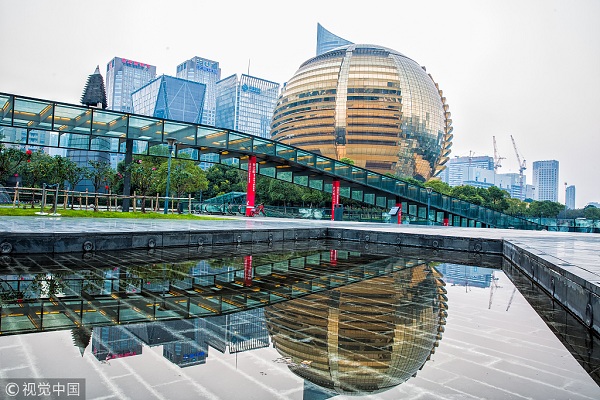Financial industry

Hangzhou, the capital of Zhejiang province, has led the way in financial technology, wealth management and cross-border payment in recent years.
Not only did it explore emerging industrial forms such as financial cloud computing platforms and blockchain technology, it also sought the integration of financial activities with the internet, data technology and artificial intelligence. With efforts made in both new and traditional methods of wealth management, Hangzhou has established a comprehensive financial management system.

The well-developed private capital sector in Hangzhou and the rapid development of private equity have infused vitality into the local real economy. So far, the number of private equity managers registered with the Asset Management Association of China has reached 1,485, and the city’s registered market value of assets under management has totaled nearly 435.4 billion yuan ($65 billion), ranking fourth in the country, according to the city’s municipal finance office.
Hangzhou’s financial industry has always been dedicated to serving the real economy. In 2017, 16 banking institutions in Hangzhou signed a strategic cooperation agreement with the municipal government to invest 619.49 billion yuan in various real industries.

Moreover, to bolster the financing of small and micro businesses, Hangzhou has promoted a series of new modes of financial services, such as renewal of loans without repayment of the principal. In 2017 there was a year-on-year increase of 14.96 percent in the number of loans for the city's small and micro enterprise, with the figure reaching 567.47 billion yuan.
According to data recently released by Hangzhou’s municipal development and reform commission, in 2018, local financial institutions provided funding of 142.78 billion yuan for 571 provincial-level projects, an increase of 6 billion yuan over 2017.
The city government officially implemented the Phoenix Action plan April 23, 2018, offering grants up to 10 million yuan to refinancing investment projects. Since the launch of the program, more measures have been taken by Hangzhou to support listed companies. Plans for cultivating technology-based small, medium-sized and high-tech enterprises have also been put forward.
This advanced policy system, coupled with a solid industrial base, has led to a bumper harvest. By the end of May 2018, Hangzhou had 167 domestic and foreign listed companies with total market capitalization of 5 trillion yuan. The number is second only to Beijing, Shanghai and Shenzhen, and ranks first among all provincial capital cities.
MOST POPULAR
- 1 China Daily's 'Shopping in China' platform appeals to intl audiences
- 2 China updates Catalogue of Encouraged Industries for Foreign Investment
- 3 Policies concerning expats, foreign enterprises in December 2025
- 4 China becomes the world's fourth manufacturing power
- 5 China ascends global higher education ranking







